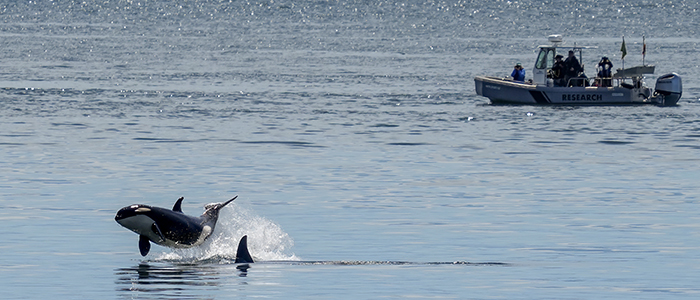What poop can tell us about the health of Southern Resident Killer Whales
||| FROM TATE THOMPSON for THE WHALE MUSEUM |||
Join us at The Whale Museum on August 10 at 7 p.m. for a lecture presented by Deborah Giles of Wild Orca. The talk is FREE and open to the public. Using the superpower of a dog’s nose allows Wild Orca’s team to remain further away from the whales than other methods, making this research non-invasive. Wild Orca’s high-impact conservation research program utilizes one-of a-kind non-invasive methods. We’re stronger together, so we collaborate with the most respected names in wildlife conservation research to paint a near real-time picture of the health of endangered Southern Resident killer whales, and provide timely data to the public and management agencies used to understand and address the causes of population decline.
Deborah Giles serves as the Research Director for Wild Orca, monitoring the Southern Resident killer whales’ health through non-invasive sampling with Eba, her highly-trained scent detection dog. Giles collaborates with government scientists and other researchers to enhance understanding of the many impacts on these endangered whales from overfishing, pollution and noise. She represents their interests with policymakers, and is frequently interviewed by print and broadcast media as one of the principal voices calling for the recovery of these endangered orcas.
For more information, call (360) 378-4710 ext.30. The Whale Museum is located in Friday Harbor at 62 First St. N. Founded in 1976, The Whale Museum’s mission is to promote stewardship of whales through education and research. Learn more at whalemuseum.org.
**If you are reading theOrcasonian for free, thank your fellow islanders. If you would like to support theOrcasonian CLICK HERE to set your modestly-priced, voluntary subscription. Otherwise, no worries; we’re happy to share with you.**







